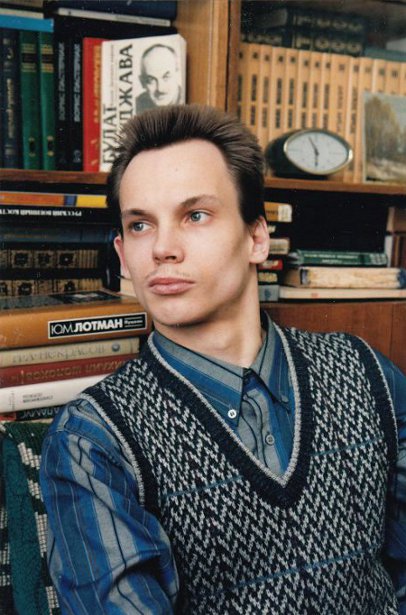Alexander Vlasov

Shortly about myself
I born in 1974 in Kostroma. Graduated from the Philology Faculty of the Kostroma State University named after N. A. Nekrasov. Literary scholar, candidate of philology, independent researcher. Research interests include Russian literature of the XIX and XX centuries, prose, poetry, evolution of genres. Started publishing in 1998. Author of a number of articles and the monograph “Yuri Zhivago’s Poems by B. L. Pasternak (Plot Dynamics of the Poetic Cycle and the ‘Prosaic’ Context)” (Kostroma: Kostroma State University named after N. A. Nekrasov, 2008).
Twenty years ago, I started learning the basics of webmastering in my spare time. The results are evident in this website created in 2009 and my participation in the local history internet project “Kostromka”.
I also write poetry. I have been interested in drawing since childhood. Recipient of scholarships from the All-Union Children's Fund and the Moscow Youth Patriotic Center “Young Motherland” (1991), laureate of the magazine “Krokodil” (1992), laureate of the international charity program “New Names” (1994).
However, this is a separate topic. A special section of my website is dedicated to graphics.
New publications
-
“The Living Presence” (On the Interpretation of the Image of Pushkin in Vladimir Nabokov’s novel “The Gift”)
The article discusses some aspects of the image of Alexander Pushkin in Vladimir Nabokov's novel “The Gift”. Particular attention is paid to the meaning that a quote from A.N. Sukhoshchokov’s fictional memoirs acquires in the general context of the novel.
-
“Beyond the Skyline of the Page” (On the Poetic Epilogue of Vladimir Nabokov’s Novel “The Gift”)
The article analyzes Vladimir Nabokov’s poem “Good-by, my book! Like mortal eyes…”. It detects the meaning of the poem in the general artistic context of the novel “The Gift”.
-
“…A Pure Art Admirer Applauds It” (Salierian Theme in Vladimir Nabokov’s Novel “The Gift”)
The article reveals direct and indirect references to Alexander Pushkin’s play “Mozart and Salieri” in the novel “The Gift” by Vladimir Nabokov. It analyzes the meaning that the images and problems of Pushkin’s play acquire in the artistic world of the novel.
-
Prince Myshkin and “Superprose” (Dostoevsky’s Motifs in Yuri Polyakov’s Novel “A Goatling in Milk”)
The article analyzes some images and episodes of Yuri Polyakov’s novel “A Goatling in Milk” correlated with specific realities of Fyodor Dostoevsky’s artistic world. It clarifies the meaning of Dostoevsky’s motifs in general context of the novel.
-
“…And the Spirit of God Was Moving over the Face of the Waters” (Sea Symbolism in Anton Chekhov’s Story “The Duel”)
The article analyzes the sea leitmotif in Anton Chekhov’s story “The Duel”. It reveals the symbolic connotation of the several marine images and associations. The initial episode of the first chapter of the story initiates the fateful/saving occasion’s theme which is virtually destined to become the most important in “The Duel”. The analysis of the final episode of chapter XVI, where the sea is mentioned in connection with the beginning of the storm, and the sea associations in chapter XVII clarify the true meaning of the “dueling” storyline. Special attention is paid to chapter XVIII which contains an extremely significant allusion conjugated with the sea image in the general contest of the Old Testament. The author comes to the conclusion that the sea in “The Duel” is spiritual force of nature. It is the embodiment of naturalness, a symbol of that unconditional truth with which different actions, words and thoughts of the story’s personages are correlated.
-
The Dialectics of Miracle. On the Semantics of Movement in Nikolai Gogol’s Novel “Dead Souls”
The article analyzes some aspects of the semantics of movement in Nikolai Gogol’s novel “Dead Souls”. It focuses on the dynamics and evolution of Chichikov’s image. Special attention is paid to the lyrical digression about the “ptitsa-troika” that finalizes the first part of the novel.
-
“To follow alive tracks…” (Chronotope in Russian philosophical lyrical poetry: Tyutchev, Zabolotsky, Pasternak)
The article touches upon the issue of artistic time and space correlation in Russian philosophical lyrical poetry in the light of the M. Bakhtin’s concept. Based on the chronotopic analysis of works by F. Tyutchev, N. Zabolotsky and B. Pasternak it explores specific forms of spatial and temporal localization of the subject in a lyrical poem.
Twitter: twitter.com/alstvlasov
Reddit: www.reddit.com/user/asvlasov